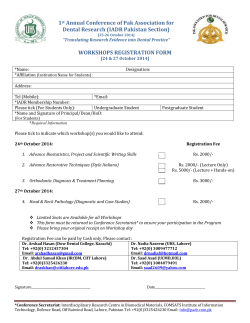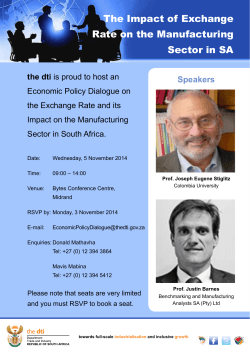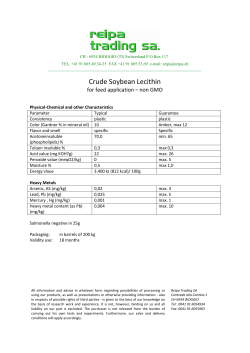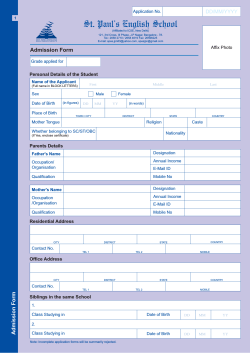
BIOWORLD TODAY
BIOWORLD TODAY TM THE DAILY BIOPHARMACEUTICAL NEWS SOURCE BIOTECH’S MOST RESPECTED NEWS SOURCE FOR MORE THAN 20 YEARS MARCH 23, 2015 VOLUME 26, NO. 55 IPO PACE QUICKENS IN EUROPE READY FOR ‘PRIME’ TIME? Aducanumab, AD still golden for Biogen Idec in updated phase I findings Malin, Nordic Nanovector raise $415M in upsized Dublin, Oslo offerings By Marie Powers, News Editor By Cormac Sheridan, Staff Writer It’s increasingly difficult to generate a big move in shares of a big biotech, but Alzheimer’s disease (AD) did the trick again for Biogen Idec Inc., which continued to report upbeat findings for aducanumab (BIIB037) at the 12th International Conference on Alzheimer’s and Parkinson’s Diseases and Related Neurological Disorders in Nice, France. The human recombinant monoclonal antibody, in-licensed in 2007 from Zurich, Switzerland-based Neurimmune Therapeutics AG, showed a dose- and time-dependent reduction of amyloid plaque in the brain in a pre-specified DUBLIN – Investor appetite for European biotech shows no sign of relenting, as Malin Corp. plc and Nordic Nanovector ASA priced their respective IPOs Friday, which will take in $415 million in total. Dublin-based Malin set a new benchmark for a European biotech IPO, See Biogen, page 2 See IPOs, page 4 DEALS AND M&A REGULATORY IN THE CLINIC Lilly strikes $456M oncology deal with China’s Innovent Court: BPCIA ‘patent dance’ merely an optional safe harbor By Michael Fitzhugh, Staff Writer By Mari Serebrov, Regulatory Editor Eli Lilly and Co. is tapping China’s Innovent Biologics Inc. to develop and manufacture a strategic portfolio of potential cancer therapies in one of the largest biotech collaborations between a The patent dance laid out in the Biologics Price Competition and Innovation Act (BPCIA) is merely a temporary safe harbor that biosimilar sponsors may opt out of, a federal THE BIOWORLD BIOME BITE ME No free lunch between mosquitoes and GMOs By Anette Breindl, Senior Science Editor BioWorld Science Editor Anette Breindl takes a closer look at translational medicine Read this week’s edition Protein shake-up in PD: Anti-synuclein’s phase I results boost Prothena By Randy Osborne, Staff Writer Unlike Alzheimer’s disease (AD), which took much of the spotlight Friday, “there’s not another gene to argue over” in Parkinson’s disease (PD), said CEO See Prothena, page 7 See BPCIA, page 6 See Innovent, page 5 BENCH PRESS SINGLE DOSE DATA ‘DRAMATIC’ Genetically modified foods have the dubious distinction of being the scientific topic with the widest opinion gap between scientists and the lay public. In a report on “Public and Scientists’ See Mosquitoes, page 8 For Sales Inquiries: http://ip-science.interest.thomsonreuters.com/Bioworld_Sales_Inquiry. NORTH AMERICA, Tel: +1-855-260-5607. Outside of the U.S. and Canada, Tel. +44-203-684-1797. For Customer Service Inquiries, NORTH AMERICA, Tel: +1-800-366-4474. Outside of the U.S. and Canada, Tel. +44-203-684-1796. Or email bioworld.support@thomsonreuters.com. Copyright ©Thomson Reuters. Reproduction is strictly prohibited. Visit our website at www.bioworld.com. CHINA Ascletis’ triple therapy HCV drug nails phase II trial in Chinese patients By Shannon Ellis, Staff Writer SHANGHAI – Upstart domestic biotech Ascletis Inc., with offices in the U.S. and China, is a step closer to realizing its dream of having the first effective hepatitis C virus (HCV) treatment on the See Ascletis, page 9 MONDAY, MARCH 23, 2015 BIOWORLD™ TODAY Ascletis Continued from page 1 market in China. But it is facing a race against time, going up against much heavier hitters such as Gilead Sciences Inc., of Foster City, Calif. A protease inhibitor, ASC08 (or dapovenir), was licensed from Basel, Switzerland-based Roche AG in April 2013, giving Ascletis the Greater China rights. At the time, Roche had data in Caucasians and proof of concept, but no data existed in Asian patients. “When we saw the Caucasian data we predicted in Chinese patients that SVR [sustained viral response] should be better than 90 percent, but we wanted the data,” Jinzi Wu, CEO and president of Ascletis, told BioWorld Today. Now with phase II results on hand from a trial in noncirrhotic patients in Taiwan, Wu said investigators have observed a cure rate (SVR12) of 94 percent after 12 weeks of treatment. “Basically, we have a huge step here. After we saw these data, it is a big relief and better than what we predicted,” said Wu. Ascletis presented its data at the Annual Asian Pacific Association for the Study of Liver (APASL) meeting where it shared the event’s top honors, known as the Choice of President’s, with Gilead Science’s sofosbuvir and Bristol-Myers Squibb Co.’s beclabuvir. A direct-acting antiviral agent (DAA), ASC08 is considered a triple therapy working in conjunction with the current standard of care to speed up and improve efficacy, especially in Asian patients. Currently, there is no DAA on the market in China. “The study results indicate that ASC08, in combination with peginterferon alfa 2a plus ribavirin, can deliver better cure rate in Chinese patients where genotype 1b predominates, as compared to Caucasian patients where genotype 1a predominates,” said Jinhoang Kao, professor and director of the clinical research institute at Taiwan University, who presented the results at the meeting. In particular, the ASC08 trial showed that in genotype 1 Taiwanese patients the SVR12 rate was 94 percent but in genotype 1b, which accounts for 57 percent of all genotype patients in Mainland China, the SVR12 rate was 100 percent in noncirrhotic Taiwanese patients. The treatment showed comparable side effects to the current standard of care (peginterferon plus ribavirin). According to Wu, during China’s national liver day on March 18, the government released new numbers, which showed the enormity of the problem in China: It is now estimated there are 40 million people in China living with HCV. Estimated is an operative word since doctors lack understanding of HCV and it remains highly underdiagnosed. The China numbers dwarf the extent of the problem in the U.S., where there are 3.2 million sufferers. Moreover, the China numbers of HCV patients can change rapidly with rates rising due to modern lifestyle habits and better diagnosis capabilities and awareness. PAGE 9 OF 14 A DOMESTIC ADVANTAGE Although the trial was conducted in Taiwan, Ascletis’ goal is clearly the huge patient population in China. However, like many companies, there are greater regulatory uncertainties about timelines on the mainland. Wu emphasized the company’s aim is to have the treatment on the market as soon as possible in China, but is vague on the details about when, perhaps not wanting to give away too much to the competition. Having such strong data on Chinese patients he hopes will help to improve the case with the local regulators who view having data on Chinese patients a priority. “First, our confidence is increased that this drug works in China in Chinese patients, even better than in Caucasians,” Wu said. “Second, [the data] will help us to accelerate clinical development in China.” Another factor when Ascletis looks over the shoulder at the big boys is that Wu, as a member of the 1,000 talents programs, a government program to lure top level returnees back to the mainland, and his company is considered a local company. “We are all competing for the China market,” said Wu, “but we have certain advantage as a domestic company.” Before Ascletis, Wu was vice president of global HIV drug discovery at Glaxosmithkline plc, based in Research Triangle Park, N.C. Ascletis has offices in Research Triangle Park as well as in Hangzhou and Shaoxing, both in Zhejiang province. Last fall, the firm announced the construction of a cGMP facility in Shaoxing. Wu and his team’s global contacts have helped to sign Chinafocused deals with a nice roster of big pharma, including an HIV protease inhibitor deal with Johnson & Johnson-owned Janssen Biotech Inc., an agreement for a liver cancer drug targeting VEGF and KSP from Cambridge, Mass.-based Alynlam Pharmaceuticals Inc. and, most recently, a deal for another HCV candidate, an NS5A inhibitor from Presidio Pharmaceuticals Inc., of San Francisco. (See BioWorld Today, Nov. 19, 2014.) In describing how the two HCV candidates work together, Wu said, “we put the two together to have synergy. The objective is to have an oral interferon-free regimen. . . . Our two drugs together offer an interferon-free regimen. We have two drugs for patients with different needs in China.” // Prothena Continued from page 7 limelight – and with a major pharma partner – “we think there could be a renewed interest in Prothena, and there is lots of room to go, as it is still only a $1.3 billion market cap (not to mention there is a third antibody for psoriasis that is starting phase I [trials] shortly, in the first half of this year,” Yee wrote in a research report. // For Sales Inquiries: http://ip-science.interest.thomsonreuters.com/Bioworld_Sales_Inquiry. NORTH AMERICA, Tel: +1-855-260-5607. Outside of the U.S. and Canada, Tel. +44-203-684-1797. For Customer Service Inquiries, NORTH AMERICA, Tel: +1-800-336-4474. Outside of the U.S. and Canada, Tel. +44-203-684-1796. Or email bioworld.support@thomsonreuters.com. Copyright ©Thomson Reuters. Reproduction is strictly prohibited. Visit our website at www.bioworld.com.
© Copyright 2025









